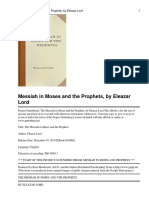0 ratings0% found this document useful (0 votes)
21 viewsMidterm Reviewer
Midterm Reviewer
Uploaded by
Maurice Jane Eunice AyogGod establishes a covenant with Abraham that will bless all nations. This covenant is the foundation for God's plan to choose the Israelites as his people. Key aspects of God's promise to Abraham include that he will have many descendants who will inherit Canaan, and through whom all people will be blessed. Abraham's faith and obedience to God's call to leave his home and father's house exemplify how believers should respond to God with trust. God renews his promise to Abraham multiple times, most notably after Abraham shows his faith by being willing to sacrifice his son Isaac at God's command. This establishes Abraham as the father of faith for obeying God without hesitation.
Copyright:
© All Rights Reserved
Available Formats
Download as DOCX, PDF, TXT or read online from Scribd
Midterm Reviewer
Midterm Reviewer
Uploaded by
Maurice Jane Eunice Ayog0 ratings0% found this document useful (0 votes)
21 views3 pagesGod establishes a covenant with Abraham that will bless all nations. This covenant is the foundation for God's plan to choose the Israelites as his people. Key aspects of God's promise to Abraham include that he will have many descendants who will inherit Canaan, and through whom all people will be blessed. Abraham's faith and obedience to God's call to leave his home and father's house exemplify how believers should respond to God with trust. God renews his promise to Abraham multiple times, most notably after Abraham shows his faith by being willing to sacrifice his son Isaac at God's command. This establishes Abraham as the father of faith for obeying God without hesitation.
Original Title
MIDTERM REVIEWER
Copyright
© © All Rights Reserved
Available Formats
DOCX, PDF, TXT or read online from Scribd
Share this document
Did you find this document useful?
Is this content inappropriate?
God establishes a covenant with Abraham that will bless all nations. This covenant is the foundation for God's plan to choose the Israelites as his people. Key aspects of God's promise to Abraham include that he will have many descendants who will inherit Canaan, and through whom all people will be blessed. Abraham's faith and obedience to God's call to leave his home and father's house exemplify how believers should respond to God with trust. God renews his promise to Abraham multiple times, most notably after Abraham shows his faith by being willing to sacrifice his son Isaac at God's command. This establishes Abraham as the father of faith for obeying God without hesitation.
Copyright:
© All Rights Reserved
Available Formats
Download as DOCX, PDF, TXT or read online from Scribd
Download as docx, pdf, or txt
0 ratings0% found this document useful (0 votes)
21 views3 pagesMidterm Reviewer
Midterm Reviewer
Uploaded by
Maurice Jane Eunice AyogGod establishes a covenant with Abraham that will bless all nations. This covenant is the foundation for God's plan to choose the Israelites as his people. Key aspects of God's promise to Abraham include that he will have many descendants who will inherit Canaan, and through whom all people will be blessed. Abraham's faith and obedience to God's call to leave his home and father's house exemplify how believers should respond to God with trust. God renews his promise to Abraham multiple times, most notably after Abraham shows his faith by being willing to sacrifice his son Isaac at God's command. This establishes Abraham as the father of faith for obeying God without hesitation.
Copyright:
© All Rights Reserved
Available Formats
Download as DOCX, PDF, TXT or read online from Scribd
Download as docx, pdf, or txt
You are on page 1of 3
REED 1: Salvation History made Israel a people, his people; thus his
people is chosen gratuitously, in keeping
and Life of Christ with a loving design conceived as far back
as the Creation and one which stays
operative despite the infidelities of men.
Origin of the patriarchs: The patriarchs in the
From the beginning there is an implicit
history of Salvation
covenant with Adam. This is made explicit
The following is taken from the Navarre Bible
with Noah, Abraham and, later, with Moses,
Pentateuch (footnote for Genesis 11:27-50:26):
i.e., with the whole people through Moses. In
it is a story of clans and tribes, set in a
the Patriarchs we see the pattern of
chronological framework with references to
Promise, Election and Covenant. Later with
geographical places in the Middle East.
Moses the element of Law is also added.
Abraham emerges as the father of Ishmael
(Casciaro and Monforte, God, the World and
and Isaac. Ishmael is the ancestor of the
Man, p. 315)
Ishmaelites (or Arabs); Isaac, the father of
To promise means to pledge to a person
the chosen people. Isaac is the father of
both one's strength and one's fidelity,
Esau and Jacob. Esau is identified with
proclaiming that one is sure of the future and
Edom; Jacob (or Israel) will be the father of
sure of oneself; it also elicits from the other
twelve sons, who go down to Egypt and
person commitment of heart and generosity
whose descendants came back from there,
of faith.
forming the twelve tribes, the people of
For God promising already means giving,
Israel. The people of Israel form the subject
since he can never fail and never deceive.
of the book of Exodus.
His promise inspires a faith capable of hope
In this patriarchal history the main thing the
that the gift will come. In Israel the promises
Bible wants to show is that God's plan is
God made to Abraham are the key to a
being put into effect--his plan to choose one
history of salvation, which is about the
people so as to make a covenant with it, the
fulfilment of God's prophecies and oaths.
covenant of Sinai; that is prepared for by
The divine promises are irrevocable, even
means of earlier covenants that God makes
though the infidelities of Israel will entail
with the patriarchs. God's saving plan begins
some hold-ups on the way.
to take concrete form with Abraham.
The promises God made to Abraham are:
Abraham came from the city of Ur, in the
1. a multitude of descendants
south of Mesopotamia, along the banks of
2. God will provide for those descendants
the Euphrates River, close to the Persian
in a special way
Gulf. When he first migrated with his father
3. The possession of the land of Canaan
Terah, they went to Haran, to the northeast,
4. Victory over their enemy
between the two great rivers. It is from
5. All nations will be blessed in him and
Haran where he set out for Canaan,
his descendants
sometime between 1800 and 1600 BC
The fundamental promise, the ground of
many future promises, is to be found in
Genesis 12:1-3. Here the author continues
the historia salutis sketched out in the first
11 chapters of Genesis, but from a new
vantage point. In Gen. 3:15 (the
Protoevangelium)
The choice of Abraham, his calling, uproots
him from his fatherland and kinsfolk, to make
him the father of a great people and the
Periods of Abraham, Isaac and Jacob:
instrument of God's blessing on all the
election, promise and faith
nations of the earth. And Abraham's faith,
In the Protoevangelium a future salvation is
trust and submission to God make him a
promised to Adam and Eve after the original
model for all future generations.
sin.
The call of Abraham is a key passage to
Later, after the flood, Noah is guarantee a
understanding the theology of biblical and
new order in the world. There follows the
world history.
divine promise to the patriarch Abraham,
Now Yahweh said to Abram, "Go from your
which is renewed to his descendants Isaac
country and your kindred and your father's
and Jacob and which extends to all their
house to the land that I will show you. And I
descendants.
will make of you a great nation, and I will
This promise has to do, immediately, with
bless you, and make your name great, so
their obtaining the country where the
that you will be a blessing. I will bless those
Patriarchs lived (the Promised Land), but it
who bless you, and him who curses you I
involves much more than that: it means
will curse; and by you all the families of the
there is a special, unique, relationship
earth shall bless themselves." (Genesis
between Israel and the "God of the fathers".
12:1-3)
For Yahweh has called Abraham to perform
The Catechism of the Catholic Church
a special mission, and this calling prefigures
teaches us
the election of Israel. It is Yahweh who has
The Letter to the Hebrews, in its great
eulogy of the faith of Israel's ancestors, lays
special emphasis on Abraham's faith
"By faith, Abraham obeyed when he was
called to go out to a place which he was to
receive as an inheritance; and he went out,
not knowing where he was to go." (Hebrews
11:8; cf Genesis 12:1-4) By faith, he lived as
a stranger and pilgrim in the promised land.
(Cf Genesis 23:4) By faith, Sarah was given
to conceive the son of the promise. And by
faith Abraham offered his only son in
sacrifice. (Cf Hebrews 11:17)
God repeats his promise a number of times,
the most solemn instance being that in the
passage about the sacrifice of Isaac, his
son :
And the angel of Yahweh called to Abraham
a second time from heaven, and said, "By
myself I have sworn, says Yahweh, because
you have done this, and have not withheld
your son, your only son, I will indeed bless
you, and I will multiply your descendants as
the stars of heaven and as the sand which is
on the seashore. And your descendants
shall possess the gate of their enemies and
by your descendants shall all the nations of
the earth bless themselves because you
have obeyed my voice." (Genesis 22:15-18).
Yahweh swears solemnly and confirms his
promise to Abraham as a reward for his
heroic faith and obedience.
God renews the covenant with Isaac, when
God intervenes in favour of Isaac at the time
of his meeting with Abimelech:
And Yahweh appeared to him, and said, "Do
not go down to Egypt; dwell in the land of
which I shall tell you. Sojourn in this land,
and I will be with you, and will bless you; for
to you and to your descendants I will give all
these lands, and I will fulfil the oath which I
swore to Abraham your father. I will multiply
your descendants as the stars of heaven,
and I will give to your descendants all these
lands, and by your descendants all the
nations of the earth shall bless themselves:
because Abraham obeyed my voice and
kept my charge, my commandments, and
my laws." (Genesis 26:2-5)
The promises is passed on like a family
heirloom to Jacob, even though Jacob had
been away from Canaan for 20 years, and
his life has been marked by a certain degree
of profanity.
And behold, Yahweh stood above it and
said, "I am Yahweh, the God of Abraham,
your father, and the God of Isaac; the land
on which you lie I will give to you and to your
descendants; and your descendants shall be
like the dust of the earth[...]" (Genesis 28:13-
14).
ENGLISH 1: Purposive
Communication
Communication and Globalization
Globalization – is the process by which people
and goods move easily across borders.
Globalization has speeded up
enormously(hugely/largely) over the last
half-century, thanks to great leaps in
technology.
The internet has revolutionized (developed)
connectivity and communication, and help
people share their ideas much more widely.
You might also like
- The Subtle Art of Not Giving a F*ck: A Counterintuitive Approach to Living a Good LifeFrom EverandThe Subtle Art of Not Giving a F*ck: A Counterintuitive Approach to Living a Good LifeRating: 4 out of 5 stars4/5 (5991)
- The Gifts of Imperfection: Let Go of Who You Think You're Supposed to Be and Embrace Who You AreFrom EverandThe Gifts of Imperfection: Let Go of Who You Think You're Supposed to Be and Embrace Who You AreRating: 4 out of 5 stars4/5 (1112)
- Never Split the Difference: Negotiating As If Your Life Depended On ItFrom EverandNever Split the Difference: Negotiating As If Your Life Depended On ItRating: 4.5 out of 5 stars4.5/5 (899)
- Hidden Figures: The American Dream and the Untold Story of the Black Women Mathematicians Who Helped Win the Space RaceFrom EverandHidden Figures: The American Dream and the Untold Story of the Black Women Mathematicians Who Helped Win the Space RaceRating: 4 out of 5 stars4/5 (932)
- Grit: The Power of Passion and PerseveranceFrom EverandGrit: The Power of Passion and PerseveranceRating: 4 out of 5 stars4/5 (619)
- Shoe Dog: A Memoir by the Creator of NikeFrom EverandShoe Dog: A Memoir by the Creator of NikeRating: 4.5 out of 5 stars4.5/5 (546)
- The Hard Thing About Hard Things: Building a Business When There Are No Easy AnswersFrom EverandThe Hard Thing About Hard Things: Building a Business When There Are No Easy AnswersRating: 4.5 out of 5 stars4.5/5 (357)
- Her Body and Other Parties: StoriesFrom EverandHer Body and Other Parties: StoriesRating: 4 out of 5 stars4/5 (831)
- Elon Musk: Tesla, SpaceX, and the Quest for a Fantastic FutureFrom EverandElon Musk: Tesla, SpaceX, and the Quest for a Fantastic FutureRating: 4.5 out of 5 stars4.5/5 (477)
- The Emperor of All Maladies: A Biography of CancerFrom EverandThe Emperor of All Maladies: A Biography of CancerRating: 4.5 out of 5 stars4.5/5 (275)
- The Little Book of Hygge: Danish Secrets to Happy LivingFrom EverandThe Little Book of Hygge: Danish Secrets to Happy LivingRating: 3.5 out of 5 stars3.5/5 (426)
- The World Is Flat 3.0: A Brief History of the Twenty-first CenturyFrom EverandThe World Is Flat 3.0: A Brief History of the Twenty-first CenturyRating: 3.5 out of 5 stars3.5/5 (2281)
- The Yellow House: A Memoir (2019 National Book Award Winner)From EverandThe Yellow House: A Memoir (2019 National Book Award Winner)Rating: 4 out of 5 stars4/5 (99)
- The Sympathizer: A Novel (Pulitzer Prize for Fiction)From EverandThe Sympathizer: A Novel (Pulitzer Prize for Fiction)Rating: 4.5 out of 5 stars4.5/5 (125)
- Devil in the Grove: Thurgood Marshall, the Groveland Boys, and the Dawn of a New AmericaFrom EverandDevil in the Grove: Thurgood Marshall, the Groveland Boys, and the Dawn of a New AmericaRating: 4.5 out of 5 stars4.5/5 (270)
- A Heartbreaking Work Of Staggering Genius: A Memoir Based on a True StoryFrom EverandA Heartbreaking Work Of Staggering Genius: A Memoir Based on a True StoryRating: 3.5 out of 5 stars3.5/5 (232)
- Team of Rivals: The Political Genius of Abraham LincolnFrom EverandTeam of Rivals: The Political Genius of Abraham LincolnRating: 4.5 out of 5 stars4.5/5 (235)
- Class 201 Student RevisedDocument34 pagesClass 201 Student RevisedPoloy TinesNo ratings yet
- On Fire: The (Burning) Case for a Green New DealFrom EverandOn Fire: The (Burning) Case for a Green New DealRating: 4 out of 5 stars4/5 (75)
- The Unwinding: An Inner History of the New AmericaFrom EverandThe Unwinding: An Inner History of the New AmericaRating: 4 out of 5 stars4/5 (45)
- Harmony of The Gospels. Analytical Outline (Robertson, A T)Document10 pagesHarmony of The Gospels. Analytical Outline (Robertson, A T)0712gp53No ratings yet
- King James Bible 1611Document857 pagesKing James Bible 1611Praise YahshuaNo ratings yet
- Bible Symbols and NumbersDocument4 pagesBible Symbols and NumbersRAKIMROCKETNo ratings yet
- Biography of 12 Apostles of ChristDocument11 pagesBiography of 12 Apostles of ChristAR Datalink Computer CenterNo ratings yet
- Bible Whiz QuizDocument21 pagesBible Whiz QuizKrisann GayleNo ratings yet
- HELL Series by Chuck CriscopdfDocument55 pagesHELL Series by Chuck CriscopdfJohn PaulNo ratings yet
- Authorship of The Pentateuch: Monika BajićDocument9 pagesAuthorship of The Pentateuch: Monika Bajićpishoi gergesNo ratings yet
- Behold Then The Goodness of GodDocument24 pagesBehold Then The Goodness of Godrafael capiliNo ratings yet
- New Moons & Sacred Calendar: Should Christians Recognise The Significance and Meaning of TheDocument58 pagesNew Moons & Sacred Calendar: Should Christians Recognise The Significance and Meaning of TheBot PsalmernaNo ratings yet
- Seters - 1970-The Conquest of Sihon's Kingdom A Literary ExaminationDocument17 pagesSeters - 1970-The Conquest of Sihon's Kingdom A Literary ExaminationPáll LászlóNo ratings yet
- The Old Testament Apocrypha SummariesDocument17 pagesThe Old Testament Apocrypha SummariesDavid BaileyNo ratings yet
- Seven Feast DaysDocument7 pagesSeven Feast DaysHerard NapuecasNo ratings yet
- Erq124 01Document8 pagesErq124 01tamboopongNo ratings yet
- Signs in The Gospel of JohnDocument3 pagesSigns in The Gospel of JohnRandy NealNo ratings yet
- The Rapture in The Old Testament PDFDocument1 pageThe Rapture in The Old Testament PDFdeodrrsNo ratings yet
- The Pre-Flood World, Part 2 - Creation MomentsDocument4 pagesThe Pre-Flood World, Part 2 - Creation MomentsJesus Manuel Ninachoque QuispeNo ratings yet
- Yesu Ni Wangu YahwehFrench MusicDocument2 pagesYesu Ni Wangu YahwehFrench MusicLechetze D. Lewis100% (2)
- The Contemporaneous Beasts View of Daniel 7Document22 pagesThe Contemporaneous Beasts View of Daniel 7Marko PetrovićNo ratings yet
- The Messiah in Moses and TheDocument160 pagesThe Messiah in Moses and TheGloria ChicaraNo ratings yet
- 04-The-Purple-Book-For-Study-Purposes-Chapter 4Document10 pages04-The-Purple-Book-For-Study-Purposes-Chapter 4Joanne ManacmulNo ratings yet
- "And The Books Were Opened": What Books Will Be Opened at My Judgment? Something We Each Must ConsiderDocument18 pages"And The Books Were Opened": What Books Will Be Opened at My Judgment? Something We Each Must ConsiderGosaye DesalegnNo ratings yet
- W22 CENT04 enDocument3 pagesW22 CENT04 enPeter SimpsonNo ratings yet
- Parashah 48 Shoftim (Judges) 5777Document10 pagesParashah 48 Shoftim (Judges) 5777HaSophimNo ratings yet
- For God So LovedDocument6 pagesFor God So Lovedalma_brinkleyrNo ratings yet
- Commentary 2kDocument145 pagesCommentary 2kNeil Retiza AbayNo ratings yet
- Pingster KoortjiesDocument28 pagesPingster Koortjiesaletcoetzer3No ratings yet
- From Iraq To Armageddon, 0768421861Document224 pagesFrom Iraq To Armageddon, 0768421861georgetacaprarescuNo ratings yet
- Hallelujah To The LambDocument19 pagesHallelujah To The LambMardocheo EsletaNo ratings yet
- Who Wrote The Bible - Meet The 35 (Traditional) AuthorsDocument42 pagesWho Wrote The Bible - Meet The 35 (Traditional) AuthorschieflittlehorseNo ratings yet






































































